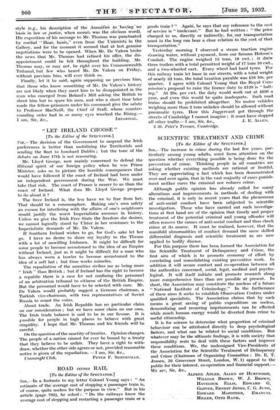SCIENTIFIC TREATMENT AND CRIME
[To the Editor of the SPECTATOR.] SIR,—The increase in crime during the last few years, par- ticularly among young adults, must focus attention on the question whether everything possible is being done for the prevention of crime. Thinking people in all countries are asking whether existing methods are rational or fruitful. They are appreciating a fact which has been demonstrated over and over again, that in the vast majority of cases punish- ment neither cures the criminal nor reduces crime.
Although public opinion has already called for many alterations and improvements in methods of dealing with the criminal, it is only in recent years that the phenomena of anti-social conduct have been subjected to scientific investigation. Those who have carried out such investiga- tions at first hand are of the opinion that timely and proper treatment of the potential criminal and young offender will often remove the causes of anti-social conduct and thus check crime at its source. It must be realized, however, that the manifold abnormalities of conduct demand the same skilled differential diagnosis and scientific treatment as are now applied to bodily disease.
For this purpose there has been formed the Association for the Scientific Treatment of Delinquency and Crime, the first aima of which is to promote economy of effort by correlating and consolidating existing preventive work. In addition it will secure contact and co-operation between all the authorities concerned, social, legal, medical and psycho- logical. It will itself initiate and promote research along 'more comprehensive lines than are possible at present. In short, the Association may constitute the nucleus of a future "National Institute of Criminology." In the furtherance of these aims it seeks to establish Observation Centres under qualified specialists. The Association claims that by such means a great saving of public expenditure on useless, demoralizing and recurring imprisonments can be effected while much human energy would be diverted from crime to useful citizenship.
It is for science to determine what proportion of criminal behaviour can be attributed directly to deep psychological factors, and what can be related to social conditions. But whatever may be the ultimate findings, it is with society that responsibility rests to deal with these factors and improve these conditions. We, the undersigned Vice-Presidents of the Association for the Scientific Treatment of Delinquency and Crime (Chairman of Organizing Committee : Dr. E. T. Jensen, 56 Grosvenor Street, London, W. 1) appeal to the public for their interest, co-operation and financial support-- We an, Sir, &c., '
ALFRED ADLER, ALLEN OF HI:11TWOOD,
• WILLIAM BROWN, W. J. BROWN, HAVELOCK ELLIS, EDWARD G. GLOVER, ERNEST JONES, C. G. JUNG, • EDWARD MAPOTHER, EMANUEL MILLER, OTTO BANK,


































 Previous page
Previous page